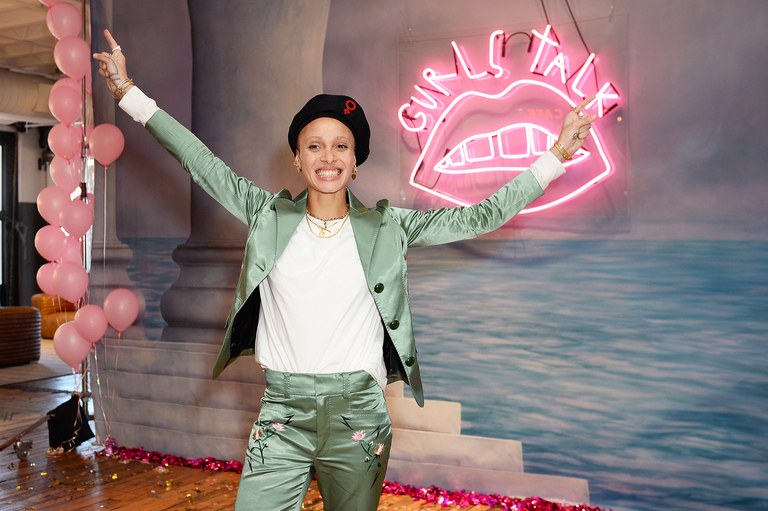Outspoken feminist, mental health advocate, and founder of Gurls Talk, Safi Bugel celebrates the model who can do it all.
Adwoa Aboah’s distinctively well-sculpted, freckled face and husky voice have almost certainly entered your radar in the last few years. From her iconic 1970s-esque cover for Edward Enninful’s first issue of Vogue in 2017, to her beautiful Burberry campaign shoot in Ghana last year, the British model has grown to be a big deal in the fashion industry. Since her early days in streetwear campaigns, Aboah has brought her effortlessly cool style and razor-sharp character to a sometimes-vapid industry. However, Aboah’s talent cannot be confined to her looks alone: her work in other spheres, notably activism, also demands respect. Since the poignant ‘StyleLikeU’ video in 2016, in which Aboah bared both her skin and her struggles before a camera, she has not hesitated to be vocal about her own suffering.
Enter Gurls Talk in 2015: a platform created to confront issues around mental health, addiction and sexuality. Something of a virtual girl gang, Gurls Talk carves a space for discussion and representation, exploring topics in a candid and judgement-free manner in an attempt to challenge any existing stigmas. With a policy of “almost nothing is taboo”, Gurls Talk invites people to submit, read and engage with other girls in an unprecedented way.
The collective, co-ran by Aboah, also organizes workshops, public discussions and parties in collaboration with exciting brands such as i-D magazine and Boiler Room. The first Gurls Talk event at 100 The Strand just two years ago culminated in a one-in-one-out policy due to high demand; the pink, streamer-draped space was full of excited teenage girls sporting their own Gurls Talk totes. In keeping with their focus on accessibility and inclusivity, the collective also engages with social media, with frequent live streams and Instagram posts offering both advice and an avenue for female-identifying people to share their experiences. Both political and brazenly personal, Gurls Talk is a safe space for womxn (of colour, especially) in a time in which it feels absolutely necessary. In an age of #MeToo and slashed mental health funding, Gurls Talk is certainly a promising retaliation.

Towards the end of 2018, Aboah launched the Gurls Talk Podcast, a series in which she explores the struggles of friends and other inspiring names in frank and open discussion. The first episode, with friend and ‘girl crush’ Jorja Smith, focuses on the singer’s experience of sport as a pastime and coping mechanism. The episode is gushy and colloquial, but this only adds to its charm: it’s real and unfiltered conversation from two members of a heavily-touched-up industry.
Nor is Aboah afraid to use her position in the fashion world to stand up for ‘unfashionable’ causes that she is passionate about. At this past London Fashion Week, Aboah took to the runway with a group of activists, among them singer Emeli Sande, as part of the community-led Justice4Grenfell campaign. Standing side-by-side in silence on the catwalk, the activists wore t-shirts emblazoned with the slogan “72 dead and still no arrests? How come?” – a reference to the billboards erected in 2018’s Oscar-winning Three Billboards Outside Ebbing, Missouri – to highlight the injustice felt by the Grenfell community.
The latest installment of Aboah’s mission to transform the fashion world is the release of a bespoke Barbie Shero doll, in collaboration with Revlon for the company’s 60th Anniversary. The doll dons Aboah’s facial features and distinct buzzcut; her tattoos are replicated beneath the miniature version of the sequin-embellished outfit that accompanied her 2017 Fashion Awards victory. To see a variation on the standard-issue pale-skinned, blonde-haired Barbie doll is a refreshing step forward in representation. Aboah pens the sad yet relatable account of being a young girl who pined for “blonde hair, light skin and blue eyes” in her Instagram announcement earlier this month. She hopes that the doll will inspire young girls whose representation continues to be unfulfilled: “I hear you and see you, this doll is for you.”
With figures like Aboah in the game, we can feel hopeful that the fashion industry will be kept dynamic and up to date. With her seminal contributions to challenging the modelling industry and wider notions of beauty, Aboah is certainly helping lead the way.
By Safi Bugel
Image: Vanity Fair

